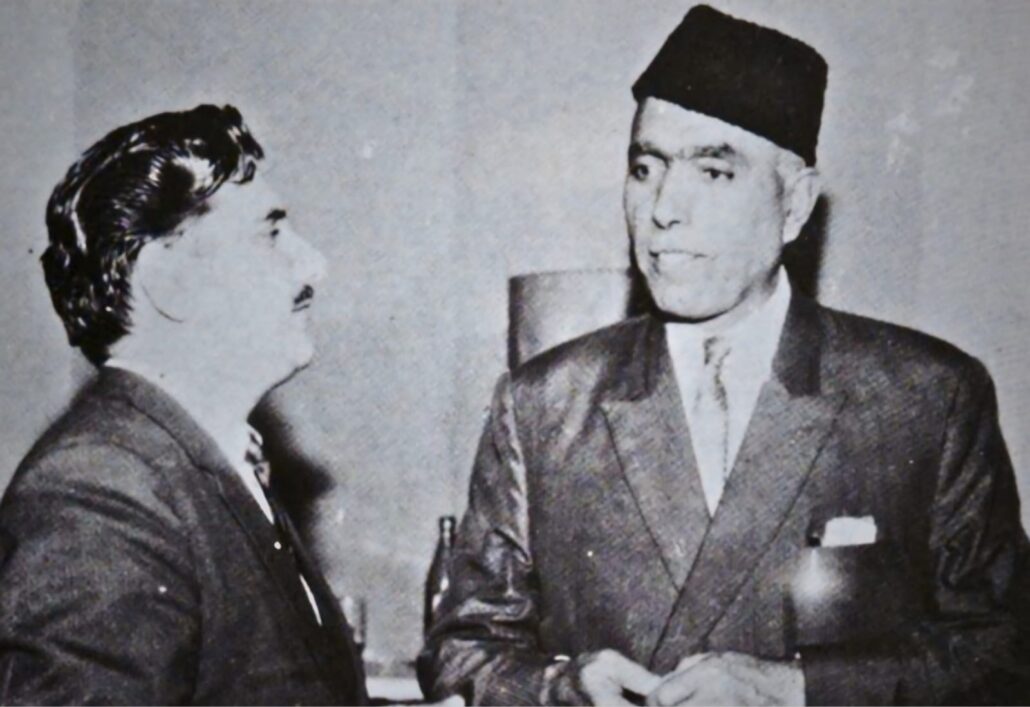
Muhammad Yousuf Gilkar
In a notable incident during his tenure as head of the Awqaf-e-Islamia Jammu Kashmir / All Jammu and Kashmir Muslim Waqf Trust, Sheikh Mohammad Abdullah took a strong stand for financial accountability and transparency regarding Waqf properties.
The incident took place at New Kashmir Press, a Waqf-owned establishment at Budshah Chowk, where most of the valley’s Urdu dailies and weeklies were printed.
During his surprise visit to the press in 1974, Sheikh Abdullah requested a list of debtors from the press manager, Sheikh Abdul Majeed.
Upon reviewing the list, it was found that almost all outstanding payments had been recovered except for the daily newspaper Hamdard, owned and edited by Ghulam Rasool Arif. Despite multiple recovery notices, Arif had failed to settle his printing dues.
Determined to address the matter personally, Sheikh Abdullah called Ghulam Rasool Arif on the phone.
Recognizing Sheikh Abdullah’s voice, Arif responded with a falsehood, claiming that the editor was not present in the office, however, Sheikh Abdullah, fully aware that it was Arif speaking, remained calm but firm.
Without hesitation, Sheikh Abdullah instructed Sheikh Abdul Majeed to keep the conversation going while he took matters into his own hands.
In an unannounced visit, Sheikh Abdullah walked from the New Kashmir Press to the Hamdard office, located on the third floor of a building on Palladium Lane. Upon entering, he confronted Ghulam Rasool Arif for his dishonesty, chastising him for evading payment obligations.
Witnesses to the incident described Sheikh Abdullah’s reaction as one of intense anger, as he scolded Arif for his behavior.
Among those present was Mohammad Amin Sufi of Abi Guzar, who, fearing Sheikh Abdullah’s wrath, sought refuge in the adjacent office of CID Inspector Mohammad Shaban Mir.
Another witness, Maqbool Hussain, the progressive-minded executive editor of Hamdard, pleaded for forgiveness on behalf of Arif.
“Sheikh Sahib showed no leniency, even though Hamdard was a strong supporter of his political movement,” recalled Gilkar, who was also present at the scene.
“He made it clear that the payment of printing charges was mandatory and ordered immediate settlement, refusing to offer any favoritism.”
This event highlighted Sheikh Abdullah’s unwavering commitment to maintaining the integrity of Waqf properties. Under his leadership, the New Kashmir Press, as part of the Waqf-e-Islamia, was protected from financial mismanagement.
Sheikh Abdullah’s introduction of a coupon system for Waqf revenue, with denominations ranging from 5 to 100 rupees, further ensured transparency and safeguarded against embezzlement.
Despite his close political ties with many figures in the valley, Sheikh Abdullah treated all individuals and entities connected to the Waqf with the same strict standard, underscoring his dedication to honesty and accountability.
Throughout his tenure as Chairman of the Muslim Awqaf Trust, Sheikh Abdullah appointed notable, trustworthy individuals to key positions within the organization.
These figures, including Mirza Kamaluddin Shida, G.M. Butt, Ghulam Rasool Dar, and Ghulam Jilani Shala, played an essential role in managing Waqf assets with diligence and integrity.
None of these individuals accepted any salary from the trust, instead dedicating their efforts to increasing its income and ensuring its long-term protection.
Sheikh Abdullah’s legacy in safeguarding Waqf properties remains a cornerstone of his contributions to Jammu Kashmir.
His reforms continue to resonate today, as Waqf properties across the region owe their survival to the policies and measures he implemented.
In the realm of social welfare, Khwaja Sadruddin Mujahid, another key figure in the Muslim Waqf Trust, led the “Anjuman Bait-ul-Maal,” providing essential services to widows, orphans, and underprivileged students.
Through generous scholarships and financial support, Mujahid ensured that many from disadvantaged backgrounds received opportunities for higher education. His selfless service also forms a significant part of the Waqf’s legacy.
The incident at New Kashmir Press serves as a reminder of Sheikh Abdullah’s uncompromising stand on truth and accountability—an approach that shaped the future of Waqf properties in Jammu Kashmir.
The author was a former students leader during the 1970s and a close associate of Sufi Mohammed Akbar of Mahaz e Azadi.




